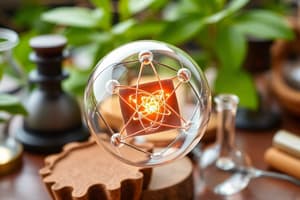Podcast
Questions and Answers
Which branch of science primarily focuses on the study of human behavior and societal structures?
Which branch of science primarily focuses on the study of human behavior and societal structures?
- Natural Sciences
- Formal Sciences
- Social Sciences (correct)
- Applied Sciences
What is the first step in the scientific method?
What is the first step in the scientific method?
- Experiment
- Analysis
- Observation (correct)
- Hypothesis
Which of the following accurately defines a scientific theory?
Which of the following accurately defines a scientific theory?
- A widely accepted opinion
- A guess based on intuition
- A well-substantiated explanation of a natural phenomenon (correct)
- A law derived from repeated experiments
Which of the following is a key concept in scientific inquiry?
Which of the following is a key concept in scientific inquiry?
Applied sciences are best characterized by their focus on which of the following?
Applied sciences are best characterized by their focus on which of the following?
What role does experimentation play in the scientific method?
What role does experimentation play in the scientific method?
Which career primarily involves conducting research and developing new medical solutions?
Which career primarily involves conducting research and developing new medical solutions?
Interdisciplinary research often merges multiple fields to address complex issues. Which is an example of a current trend in science?
Interdisciplinary research often merges multiple fields to address complex issues. Which is an example of a current trend in science?
Study Notes
Definition of Science
- Systematic enterprise that builds and organizes knowledge.
- Involves observation, experimentation, and analysis.
Branches of Science
-
Natural Sciences
- Study of the natural world.
- Includes physics, chemistry, biology, astronomy, and earth sciences.
-
Formal Sciences
- Abstract concepts and theoretical frameworks.
- Includes mathematics, logic, and statistics.
-
Social Sciences
- Study of human behavior and society.
- Includes psychology, sociology, anthropology, and economics.
-
Applied Sciences
- Practical application of scientific knowledge.
- Includes engineering and medical sciences.
Scientific Method
- Observation: Identifying phenomena.
- Question: Formulating a question based on observations.
- Hypothesis: Proposing a testable explanation.
- Experiment: Conducting tests to gather data.
- Analysis: Interpreting data to determine if it supports the hypothesis.
- Conclusion: Drawing conclusions and possibly revising the hypothesis.
Importance of Science
- Enhances understanding of the universe.
- Drives technological advancement and innovation.
- Informs public policy and health decisions.
- Addresses global challenges (e.g., climate change, disease).
Key Concepts in Science
- Theory: A well-substantiated explanation of an aspect of the natural world.
- Law: A statement based on repeated experimental observations that describes some aspect of the world.
- Experimentation: Controlled testing to validate hypotheses.
Careers in Science
- Research Scientist
- Environmental Scientist
- Medical Researcher
- Data Analyst
- Science Educator
Current Trends in Science
- Interdisciplinary research (e.g., bioinformatics).
- Emphasis on sustainability and renewable resources.
- Advancements in artificial intelligence and biotechnology.
- Increasing focus on public engagement with science.
Definition of Science
- Systematic enterprise that constructs and organizes knowledge about the natural world.
- Central to science are observation, experimentation, and analysis.
Branches of Science
- Natural Sciences: Explore the natural world and include physics, chemistry, biology, astronomy, and earth sciences.
- Formal Sciences: Focus on abstract concepts, involving fields such as mathematics, logic, and statistics.
- Social Sciences: Examine human behavior and societal structures, incorporating psychology, sociology, anthropology, and economics.
- Applied Sciences: Emphasize practical application of scientific knowledge in fields like engineering and medicine.
Scientific Method
- Observation: Initial step involves identifying phenomena of interest.
- Question: Formulating pertinent questions derived from observations.
- Hypothesis: Creating a testable proposition to explain the phenomena.
- Experiment: Performing controlled tests to collect data for analysis.
- Analysis: Scrutinizing data to ascertain if it corroborates the hypothesis.
- Conclusion: Linking findings to the hypothesis and making revisions where necessary.
Importance of Science
- Enhances comprehension of the universe and drives technological advancements.
- Informs public policies and health-related decisions.
- Plays a critical role in tackling global issues like climate change and disease management.
Key Concepts in Science
- Theory: A robust explanation supported by a substantial body of evidence concerning a natural phenomenon.
- Law: A general statement derived from consistent experimental observations that describe an aspect of the world systematically.
- Experimentation: The process of conducting controlled tests to validate or invalidate hypotheses.
Careers in Science
- Research Scientist: Engages in experimental investigation.
- Environmental Scientist: Focuses on environmental protection and conservation.
- Medical Researcher: Investigates health issues and treatments.
- Data Analyst: Works with data sets to extract meaningful insights.
- Science Educator: Teaches scientific concepts at various educational levels.
Current Trends in Science
- Increasing inclination towards interdisciplinary research, exemplified by bioinformatics.
- Greater emphasis on sustainability and the development of renewable resources.
- Significant advancements in artificial intelligence and biotechnology sectors.
- Growing focus on engaging the public and improving science literacy.
Studying That Suits You
Use AI to generate personalized quizzes and flashcards to suit your learning preferences.
Description
Explore the various branches of science including natural, formal, social, and applied sciences. This quiz will also cover the scientific method, detailing the steps from observation to analysis. Test your knowledge on how these fields interconnect and contribute to our understanding of the world.




